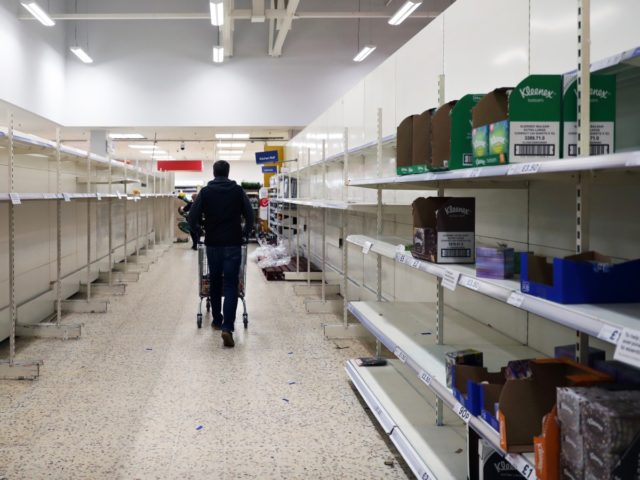Supermarket chains across the United Kingdom have embarked on a massive hiring spree to keep up with increased demand, as fear of a nation-wide coronavirus lockdown looms over the country.
Tesco, Britain’s largest supermarket chain, has announced that it will hire 20,000 new workers for at least the next three months. The move is meant to help the company manage the “unprecedented” demand being placed on supplies by shoppers stockpiling non-perishable foods, toilet roll, and other items amidst the coronavirus pandemic.
“I’m so proud to be welcoming thousands of new colleagues to Tesco,” said the supermarket’s chief people officer, Natasha Adams, in comments reported by the Evening Standard.
“Thank you to everyone offering to help as we work day and night to keep our shelves full for customers. The community spirit at Tesco is fantastic and together, we can do this,” she added.
The decision by Tesco follows Asda, Lidl, and Aldi announcing that they would be hiring 16,500 new employees, 4,000 of which will be permanent positions.
In response to the shortages, Tesco has also announced that it would be implementing a rationing system, in which customers will be limited to purchasing a maximum of three of the same item.
Coronavirus: UK Government Closes Pubs, Clubs, Restaurants, Theatres, Cinemas, and Gyms From Tonight https://t.co/g3V5LuwxXU
— Breitbart London (@BreitbartLondon) March 20, 2020
Grocers in Britain have said that the problem of food shortages in stores is not as a result of limited supply but rather the struggle to restock inventories quick enough to meet the increased demand.
“There is plenty of food, but there is a limit to how many deliveries we can do because there’s only so many lorries in our fleet and so many drivers,” one grocer told The Times.
“Our shelves are full again every morning, which shows that there isn’t an issue with supply, we just can’t replenish them fast enough to keep up the pace,” he added.
British supermarkets usually store about two weeks’ supply of long-life food products like rice and pasta, and two days’ supply of perishable goods. With restaurants and pubs closing across the country, more strain has been placed on supermarket supply chains.
The companies use algorithms based on their daily sales to determine their next order from their suppliers. However, as a result of panic buying by customers, the algorithms have been rendered obsolete.
“The buying behaviour bears no resemblance to anything any ordering algorithm would have expected. We’re not giving numbers to suppliers, we’re telling them ‘if you make it we’ll take it’”, one supermarket chief executive said.
Addressing MPs in the House of Commons, Environment Secretary George Eustice cautioned against panic, saying that there is “significant resilience in our food supply chain”.
“There isn’t a shortage of food, the challenge that we’ve had is getting food to shelves in time when people have been purchasing more,” Eustice added.
UK Rail Networks Prepare to Slash Capacity During Coronavirus Pandemic https://t.co/zNjJdLLFGR
— Breitbart London (@BreitbartLondon) March 20, 2020
Follow Kurt on Twitter at @KurtZindulka

COMMENTS
Please let us know if you're having issues with commenting.